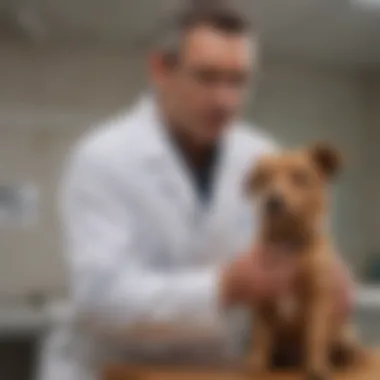Understanding Common Causes of Diarrhea in Pets


Intro
Diarrhea in pets is a widespread issue and can often lead to concern among pet owners. It can arise from various factors, including diet changes, infections, stress, and other underlying health problems. Understanding these common causes is essential for pet owners to manage their pets' health better and rectify the situation more effectively. The gastrointestinal health of pets cannot be overlooked, as it significantly influences overall well-being. The following sections discuss how to approach this issue, examining key factors that contribute to diarrhea in various animals.
Understanding Your Pet
To effectively address the issue of diarrhea, it is vital to understand your pet and its needs. Each breed may exhibit different traits when it comes to digestive health. Factors like breed characteristics and individual temperament may influence dietary needs and stress levels.
Breed Traits
Certain breeds are more susceptible to digestive issues than others. For example, small breeds like Yorkshire Terriers tend to have more sensitive stomachs. Understanding the specific traits of your pet’s breed is important for tailoring their diet and care.
Common Temperaments
The behavior of pets plays a role in their digestive health. An anxious or nervous pet may experience stress-induced diarrhea. Recognizing how your pet usually behaves can help you identify if stress or anxiety might be a factor in their diarrhea.
Special Needs
Some pets may have special dietary needs or health conditions that require careful management. For instance, pets with food allergies or intolerances must have a special diet that corresponds to these conditions.
Pet Care Essentials
Proper pet care significantly impacts gastrointestinal health. Nutrition, grooming, and wellness are three essential areas to focus on.
Nutrition and Feeding Guidelines
Feeding quality food is critical. A balanced diet helps maintain a healthy digestive system. Look for high-quality kibble or wet food that meets the nutritional standards for your pet’s age and breed. Frequent dietary changes might lead to digestion problems. Ensure to introduce new food gradually to minimize digestive distress.
Grooming Tips and Techniques
Routine grooming helps identify potential health issues before they get serious. For example, regular checks for worms or skin conditions can help catch problems early, preventing secondary issues like diarrhea. Keeping your pet clean and well-groomed should be part of your regular care regimen.
Health and Wellness
Routine veterinary visits help maintain a pet's overall health. Vaccinations and preventive treatments can reduce the risk of infections that may cause diarrhea. Awareness of any changes in your pet’s health, such as changes in appetite or behavior, is equally important.
Training and Behavior
Training and understanding the behavior of your pet can create a more stable environment, which reduces stress and the likelihood of diarrhea.
Basic Training Techniques
Effective training establishes a routine and builds confidence. A well-trained pet is generally calmer and less prone to anxiety-related issues that could affect their digestive health.
Behavioral Problems and Solutions
If your pet exhibits behavioral problems like excessive barking or destruction, it might indicate stress or anxiety, which can indirectly lead to digestive issues. Solutions may range from training techniques to behavioral therapies.
Mental Stimulation Activities
Providing mental stimulation helps reduce boredom and potential anxiety in pets. Activities, such as puzzle toys or interactive play, can keep pets engaged and happy, promoting a healthier digestive system.
Engaging with Your Pet
Spending quality time with your pet strengthens your bond and can alleviate stress.
Interactive Games and Toys
Engaging in interactive games with your pet can improve their mood and general well-being. Selecting the right types of toys can elevate positive interactions and minimize anxiety.
Safe Outdoor Activities
Regular outdoor activities are great for physical health and mental well-being. However, ensuring the environment is safe is key to your pet’s digestive health.
Family-Friendly Pet Interactions
Encouraging responsible interactions among family members with pets promotes a healthy and loving atmosphere. Stress-free environments reduce the incidence of health issues, including diarrhea.
Pet Adoption and Integration
When adopting a pet, understanding their background can aid in preventing health problems.
Choosing the Right Pet for Your Lifestyle


Consider your lifestyle before adopting a pet. Matching a pet’s needs with your ability to provide care is critical for ensuring their health.
Preparing Your Home for a New Pet
A suitable home environment includes ensuring your new pet feels safe and comfortable. This preparation helps reduce stress and potential health issues.
Tips for Smooth Prelims
When integrating a new pet into a home, practices such as gradual introductions and supervised interactions are crucial. This lowers stress for current pets and newcomers, reducing the chance of gastrointestinal issues.
Proper understanding and care can lead to healthier pets and minimize the risk of conditions like diarrhea. By focusing on comprehensive pet care, owners can enhance their pets' overall quality of life.
Understanding Diarrhea
Diarrhea in pets is not just a minor inconvenience; it is a significant health concern that pet owners must address promptly. Understanding the underlying causes and implications of diarrhea can help in taking the necessary actions to maintain the health of your pet. This article will explore various factors contributing to diarrhea, providing a comprehensive overview that aids in better pet care.
Definition and Symptoms
Diarrhea is defined as an increase in the frequency and fluidity of bowel movements. Common symptoms include loose or watery stools, increased urgency to defecate, and sometimes abdominal pain. Pet owners may observe changes in their animals' appetites or energy levels. Notably, diarrhea can manifest in different forms, such as acute or chronic.
Acute diarrhea typically lasts for a short term and may be caused by dietary indiscretions or sudden changes in eating habits. Chronic diarrhea, on the other hand, persists over a more extended period and can indicate underlying health conditions. Recognizing these symptoms is crucial for managing your pet's health effectively.
Implications for Health
The presence of diarrhea can have serious implications for a pet's overall health. Loss of fluids and electrolytes due to diarrhea can lead to dehydration, which may become life-threatening, particularly if the diarrhea is severe or prolonged. Furthermore, diarrhea can be a symptom of various infections or diseases that require veterinary attention.
Consequently, it is essential for pet owners to understand that diarrhea is not merely a gastrointestinal upset. It can signal infectous agents, dietary issues, or even chronic health conitions. Early detection and intervention can improve outcomes and prevent complications that may arise if the underlying causes are left unaddressed.
Taking these aspects into consideration underscores the importance of vigilance in monitoring your pet’s health. It is vital to have a clear understanding of what diarrhea entails to manage your pet’s well-being effectively.
Dietary Factors
Dietary factors play a crucial role in the overall health of pets. They not only affect their physical well-being but also have a direct impact on their gastrointestinal system. Understanding how diet contributes to diarrhea is essential for pet owners. A poor diet can lead to various health issues, including chronic diarrhea. By being mindful of what pets consume, owners can significantly reduce the risk of gastrointestinal disturbances.
Food Intolerance and Allergies
Food intolerance and allergies are common culprits behind diarrhea in pets. Each pet is unique in its dietary needs, and some animals may react negatively to certain ingredients. For instance, common allergens include grains, beef, and dairy. Symptoms of food allergies or intolerance can manifest as diarrhea, vomiting, or skin irritations.
When selecting pet food, look for products that offer limited ingredients or hypoallergenic options. Additionally, integrating novel protein sources, like duck or fish, might help if the pet has a known sensitivity to traditional proteins. Observing the pet's reaction to new foods is vital. It is recommended to introduce any new diet gradually to pinpoint potential intolerances.
Spoiled or Contaminated Food
Feeding pets spoiled or contaminated food is another significant reason for diarrhea. Bacteria such as Salmonella or E. coli can lead to gastrointestinal distress. Check expiration dates and ensure food storage practices are adequate.
Additionally, some pets may scavange and eat something they find outside. This behavior can expose them to contaminated substances that their stomachs cannot handle. Regularly inspecting food bowls for residues and ensuring they are cleaned can minimize risks. If you suspect your pet has ingested spoiled food, monitor their condition closely and seek veterinary advice if symptoms persist.
Abrupt Dietary Changes
Abrupt changes in a pet’s diet can also lead to diarrhea. Animals often have sensitive digestive systems, which require time to adjust to new foods. When switching brands or types of food, it is crucial to transition gradually.
A good approach is to mix the old food with new food over several days. Start with a small amount of the new food and gradually increase it while decreasing the old food. This methodlessens the stress on the animal's digestive system. If diarrhea occurs despite gradual changes, return to the previous diet and consult a veterinarian for advice to identify a more suitable dietary option.
Infectious Agents
Infectious agents play a crucial role in the health of pets. Diarrhea caused by these agents can indicate serious health concerns. Understanding how bacteria, viruses, and parasites contribute to gastrointestinal issues helps pet owners make informed decisions about treatment and prevention. Ignoring symptoms related to infectious agents could lead to more severe health problems for animals.
Bacterial Infections
Bacterial infections are one of the most common causes of diarrhea in pets. Various species of bacteria can invade the gastrointestinal tract, disrupting normal digestion. For instance, Salmonella and E. coli are notorious for causing severe diarrhea. Symptoms may include watery stools, vomiting, and lethargy.
Pet owners should be vigilant about how their pets interact with other animals. Transmission can occur through contaminated food or environments. Providing clean water and ensuring proper food handling can mitigate risks of bacterial infections.
Best Practices to Prevent Bacterial Infections:
- Regularly clean pet food and water bowls.
- Wash hands after handling pet food or being in contact with animals.
- Ensure pets are fully vaccinated and receive regular veterinary care.
Viral Infections
Viral infections can also lead to significant gastrointestinal disturbances. Viruses like Parvovirus and Coronavirus can cause severe and often lethal outcomes if not addressed promptly. Affected animals may exhibit symptoms such as severe diarrhea, vomiting, and decreased appetite.
Timely diagnosis is critical, as some viral infections can spread rapidly among pets, especially in shelters or multi-pet households. Isolation of infected animals may be necessary to prevent wider outbreaks. These infections require immediate veterinary attention for supportive care and potential antiviral treatments.
Key Considerations for Viral Infections:
- Observe for symptoms like lethargy and hesitation to eat.
- Seek immediate veterinary care if you suspect a viral infection.
- Vaccination can provide a strong preventative measure.


Parasitic Infestations
Parasitic infestations are another significant cause of diarrhea in pets. Internal parasites like worms can lead to nutrient deficiencies and gastrointestinal discomfort. Common parasites include roundworms, hookworms, and giardia. Pets infected with these parasites may show signs such as diarrhea, bloating, and poor coat condition.
Regular deworming and stool examinations are essential to reduce the risk of infestations. It's essential to understand that some parasites can be transmitted to humans, making prompt treatment crucial not only for pets but also for maintaining household health.
How to Prevent Parasitic Infestations:
- Maintain a clean living environment for pets.
- Regularly schedule veterinary check-ups for parasite screenings.
- Ensure pets receive appropriate preventative medications.
Understanding infectious agents responsible for diarrhea in pets is vital for effective management and prevention. Not all infections are obvious; therefore, observing behavioral changes and consulting with veterinarians is essential.
Non-Infectious Health Conditions
In understanding the causes of diarrhea in pets, non-infectious health conditions play a significant role. These conditions often arise from underlying issues unrelated to infections. For pet owners, recognizing these conditions is crucial as they can lead to long-term health complications if not managed properly. Addressing non-infectious health issues can lead to improved gastrointestinal health and enhance the overall quality of life for pets.
Inflammatory Bowel Disease
Inflammatory Bowel Disease (IBD) is a chronic condition affecting the gastrointestinal tract of pets, particularly dogs and cats. It often leads to malabsorption of nutrients, resulting in diarrhea that might be persistent or recurrent. The exact cause of IBD is not well understood, but it is believed to involve a combination of genetic, environmental, and immunological factors.
Symptoms of IBD include:
- Chronic diarrhea: This may present as soft stools or more severe forms.
- Vomiting: Pets might vomit periodically, often after eating.
- Weight loss: Despite a normal or increased appetite, pets may still lose weight due to poor nutrient absorption.
- Abdominal pain: Pets may show signs of discomfort or pain when their abdomen is touched.
Proper diagnosis often requires veterinary intervention, including blood tests, ultrasound, or endoscopy. Once diagnosed, treatment may involve dietary changes, medications to reduce inflammation, and regular monitoring to ensure the condition is managed effectively.
Pancreatitis
Pancreatitis is another serious non-infectious condition that affects pets, characterized by inflammation of the pancreas. This organ is vital for the production of digestive enzymes and hormones. When the pancreas becomes inflamed, it can disrupt digestion and result in diarrhea, vomiting, and abdominal pain.
Key factors that may contribute to pancreatitis include:
- High-fat diets: Rich, fatty foods are often a trigger for this condition.
- Obesity: Overweight pets are at higher risk for developing pancreatitis.
- Certain medications: Some drugs can induce pancreatitis as a side effect.
If pancreatitis is suspected, prompt veterinary attention is vital. Treatment generally includes hospitalization, supportive care, and dietary management to ease the work on the pancreas. Recovery varies by severity and promptness of treatment, making early detection crucial.
Liver Disease
Liver disease is an umbrella term for various conditions affecting the liver, an essential organ for detoxifying the body and metabolizing nutrients. When liver function deteriorates, it can impact digestion and lead to gastrointestinal symptoms such as diarrhea.
Types of liver disease include:
- Hepatitis: Inflammation of the liver can stem from infections, toxins, or autoimmune conditions.
- Cirrhosis: Eventually leading to scarring of the liver, cirrhosis often results from chronic liver insults.
- Liver tumors: Tumors can disrupt normal liver function and metabolism.
Symptoms of liver disease can include jaundice, lethargy, and diarrhea. Diagnosis often requires a comprehensive approach involving bloodwork and imaging. Treatment may involve medications, dietary changes, or more advanced interventions depending on the underlying cause and severity of the disease.
Understanding these non-infectious health conditions can empower pet owners to make informed decisions about their pet’s health management. Regular veterinary check-ups can play a vital role in early detection and intervention.
Environmental Factors
Environmental factors significantly affect the overall health of pets, including their gastrointestinal well-being. Understanding these factors can help pet owners identify the underlying causes of diarrhea. Various elements such as stress, routine changes, and exposure to toxins play crucial roles in influencing a pet’s digestive health. Recognizing these components provides an essential framework for prevention and management.
Stress and Anxiety
Pets, like humans, may experience stress and anxiety due to various factors. Common triggers include changes in the environment, loud noises, or even the absence of their owners. When pets feel stressed, their body reacts in multiple ways, including changes in digestion. Diarrhea can arise as a negative response to stress, as the gastrointestinal system is sensitive to emotional changes.
- Common stressors:
- Loud sounds (fireworks, thunderstorms)
- New pets or family members
- Changes in the living environment
A stressed pet may need comfort and reassurance. Ensuring a calm environment can mitigate stress-induced diarrhea. Pet owners should observe their animal's behavior to identify and address stressors effectively.
Change in Routine
Pets thrive on consistency. Any significant alteration to their daily routine can lead to confusion and discomfort. Changes can range from new feeding schedules to different walking paths. These routine shifts can disrupt their digestive patterns, leading to issues like diarrhea. Maintaining a stable schedule helps promote digestive regularity.
- Signs of routine disruption:
- Changes in feeding times
- Variations in exercise levels
- New habits introduced suddenly
To minimize diarrhea related to routine changes, pet owners should gradually introduce new schedules. This gradual adaptation allows your pet’s body to adjust without undue stress.
Exposure to Toxins
Pets can occasionally engage with substances that are harmful or toxic, leading to serious gastrointestinal issues, including diarrhea. Common sources of toxins include certain plants, chemicals in the house, and spoiled food. Pets are often curious and may ingest items that pose a risk to their health.


- Common household toxins:
- Certain houseplants like lilies and azaleas
- Human food unsuitable for pets, such as chocolate
- Household cleaners or chemicals
It is crucial for pet owners to be vigilant about their environment. Regularly removing hazardous substances and educating oneself about potential dangers can help prevent exposure to toxins and the subsequent health issues they cause.
Important: If a pet is suspected of ingesting a toxic substance, immediate veterinary care is essential.
Understanding these environmental factors not only empowers pet owners to take preventive measures but also enhances the quality of life for pets. By addressing stressors and ensuring a safe environment, the incidence of diarrhea among pets can be significantly reduced.
Diagnosis and Treatment
Understanding the diagnosis and treatment of diarrhea in pets is crucial for maintaining their health. Diarrhea can result from a multitude of causes, ranging from dietary issues to serious health conditions. Correctly diagnosing the cause allows for effective treatment, preventing worsening of the pet's condition. Prompt attention can lead to better outcomes and reduces the risk of complications.
When to Seek Veterinary Care
Deciding when to seek veterinary care is a critical first step when faced with a pet’s diarrhea. While mild diarrhea may resolve without intervention, certain signs indicate the need for professional help. If the diarrhea is persistent, lasting more than 24 hours, or if the pet shows additional symptoms such as vomiting, lethargy, weight loss, or blood in the stool, veterinary evaluation is essential. Other warning signs include:
- Dehydration: Check for dry gums or excessive thirst.
- Altered behavior: Signs of discomfort, anxiety, or unresponsiveness can signal a serious issue.
- Underlying health conditions: Pets with pre-existing illnesses may require immediate intervention.
Proactive measures in seeking veterinary care can save your pet from severe issues.
Diagnostic Procedures
Diagnostic procedures vary based on the severity and duration of diarrhea. Initially, the veterinarian will conduct a thorough physical examination and take a detailed medical history. This initial assessment often includes:
- Fecal Analysis: This tests for parasites, bacteria, and blood.
- Blood Tests: They help evaluate organ function and check for infections or underlying conditions.
- Imaging: X-rays or ultrasounds may be necessary to visualize internal issues.
A comprehensive diagnosis ensures no underlying conditions go untreated.
The combination of these tests aids the veterinarian in pinpointing the exact cause behind the diarrhea, leading to targeted treatment.
Treatment Options
Treatment for diarrhea in pets varies and is determined by the underlying cause. Common approaches include:
- Dietary Management: Transitioning to a bland diet, such as boiled chicken and rice, can help the digestive tract recover.
- Medications: Depending on the diagnosis, antibiotics or antiparasitics may be prescribed. Anti-diarrheal medication can be used only under veterinary guidance.
- Hydration Therapy: Ensuring pets stay hydrated is vital. In severe cases, intravenous fluids may be necessary to prevent dehydration.
- Specialty Diets: For chronic conditions like inflammatory bowel disease, a veterinarian might recommend a specific hypoallergenic diet.
Each treatment is tailored to the individual pet's needs, highlighting the significance of professional veterinary guidance throughout the healing process. Timely diagnosis and appropriate treatment contribute significantly to the recovery of pets suffering from diarrhea.
Preventative Measures
Preventing diarrhea in pets is an integral part of ensuring the overall health of these animals. By focusing on the right measures, pet owners can reduce the occurrence of gastrointestinal issues significantly. Various factors contribute to the onset of diarrhea; thus, implementing preventative strategies can prove beneficial. It is not just about treating symptoms but also about proactive management to enhance well-being.
Dietary Recommendations
A well-balanced diet is fundamental to a pet's digestive health. Choosing high-quality pet food can help minimize the risk of diarrhea. Look for diets that are rich in essential nutrients and free from fillers.
Some key points to consider include:
- Gradual Dietary Changes: When introducing new food, a gradual transition over several days helps prevent stomach upset. Introduce small amounts of the new food mixed with the old food. This reduces the risk of sudden changes that can trigger diarrhea.
- Avoid Table Scraps: While it may be tempting, giving pets human food can lead to digestive issues. Some foods that are safe for humans can be harmful to pets.
- Hydration: Ensure your pet has access to fresh water at all times. Dehydration can worsen diarrhea. Always monitor your pet's fluid intake, especially during episodes of diarrhea.
Regular Vet Check-ups
Routine veterinary visits are crucial for early detection of potential health issues. Regular check-ups allow veterinarians to monitor your pet's overall health and detect any underlying conditions that may cause diarrhea.
Benefits of regular vet visits include:
- Preventive Care: Regular vaccinations and parasite control can help prevent infections that lead to diarrhea. Discuss with your vet about proper vaccination schedules for your pet.
- Health Monitoring: Routine blood tests and examinations can catch issues before they escalate. Early intervention often results in better outcomes.
- Expert Guidance: Vets can provide dietary recommendations tailored to your pet’s specific needs. They can help identify any hidden allergies or intolerances.
Minimizing Stressors
Stress can significantly influence a pet's health, often leading to gastrointestinal disturbances. Minimizing stressors is essential in maintaining a stable digestive system.
Some actionable steps include:
- Stable Environment: Maintain a consistent routine in terms of feeding, walks, and playtime. Sudden changes in environment or routine can trigger anxiety in pets.
- Comfort Spaces: Create a quiet, comfortable area where your pet can retreat when feeling overwhelmed. This can help them feel secure.
- Socialization: Gradual exposure to new people, animals, and situations can help your pet adjust better. Socializing helps reduce fear, which can contribute to stress-related diarrhea.
Remember: Recognizing the signs of stress in your pet is vital. If your pet shows changes in behavior or appetite, consider consulting a professional.
The End
Understanding the reasons behind diarrhea in pets is crucial for owners who wish to maintain the health and well-being of their animals. By being aware of various causes, pet owners can take timely action, which can prevent minor issues from escalating into severe health problems. The discussion has covered a wide array of elements, from dietary factors to environmental issues and infectious agents.
Summary of Key Points
- Diarrhea can stem from numerous sources such as dietary indiscretions, infections, or stress.
- Identifying whether the issue is acute or chronic is vital for proper evaluation.
- Early intervention and consultation with a veterinarian can lead to better outcomes.
- Keeping a close watch on the pet’s diet and environment contributes to gastrointestinal health.
Importance of Awareness
When considering the well-being of pets, it is essential for owners to stay informed about the symptoms and potential complications of diarrhea. Awareness enables pet owners to recognize early signs, thus facilitating prompt medical attention. Subtle changes in behavior may be overlooked, but they can be indicators of underlying health problems.



